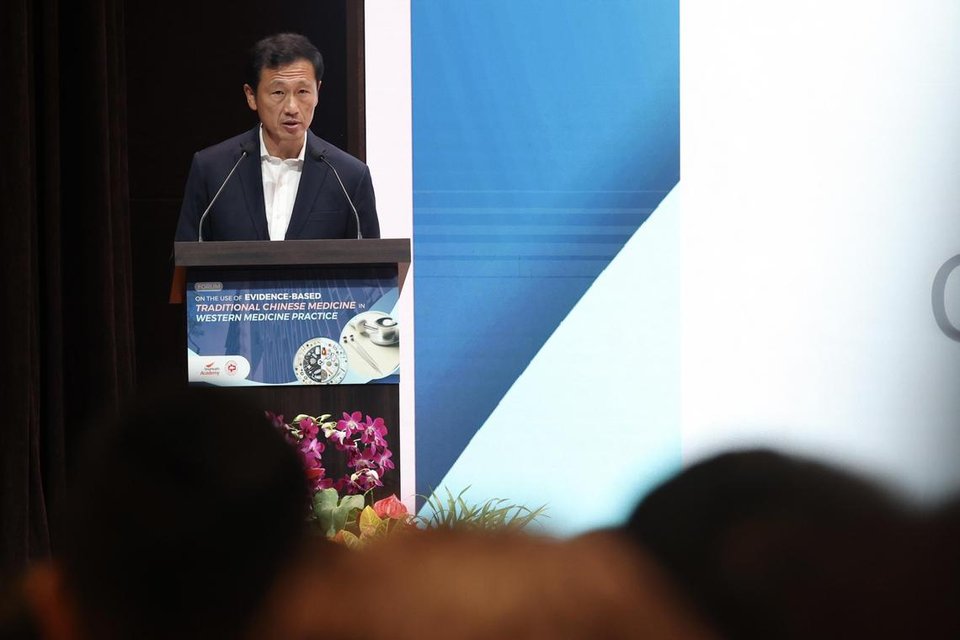
 i_need_contribute
i_need_contribute

Health Minister Ong Ye Kung noted that traditional Chinese medicine is already an integral part of Singapore’s healthcare landscape.
PHOTO: LIANHE ZAOBAO
These are among 18 proposals for evidence-based traditional Chinese medicine (TCM) treatments that the authorities are evaluating under a TCM sandbox initiative, Health Minister Ong Ye Kung said on July 6.
The other TCM treatments that the three healthcare clusters here have proposed for the sandbox include the use of Chinese medicine for treating gastrointestinal disorders and chronic pain, alongside conventional treatments.
If implemented in public clinics and hospitals, the treatments could become eligible for subsidies and MediSave coverage, which today apply to two TCM treatments: the use of acupuncture for lower back and neck pain.
Speaking at a forum on the use of evidence-based TCM in Western medicine practice, Mr Ong said the latest move follows from his announcement in October 2024 that the Ministry of Health (MOH) was evaluating the efficacy of other TCM therapies beyond those two treatments.
He emphasised that this was not about wholesale adoption of TCM treatments, but a thoughtful selection of therapies that have been shown to work, complementing Western medicine to improve outcomes for patients, including those who do not respond well to conventional treatments alone.
As a start, the proposed treatments will be evaluated for scientific robustness by an MOH-commissioned committee, and then trialled “in a controlled environment” in public healthcare institutions for one to two years.
“During the sandbox phase, our foremost priority is to ensure patient safety and maintain high standards of care,” Mr Ong said. “The evaluation will also enable us to assess the cost-effectiveness of these treatments.”
He noted that TCM is already an integral part of Singapore’s healthcare landscape, with one in five adult Singaporeans relying on TCM services each year, according to the 2022 National Population Health Survey.
“Our vision is not simply adding more TCM services to hospital settings, but to create a really integrative care model where the strengths of both systems can be leveraged for optimal patient care,” he added.
At the forum, Mr Ong also announced that from 2026, an annual national-level award jointly launched by MOH and the Academy of Chinese Medicine Singapore will recognise exemplary TCM practitioners.
There will be two categories of awards – one for outstanding physicians and the other for outstanding educators – and recipients will be awarded a cash amount of $5,000 each.
Nominees for the awards must be Singaporeans or permanent residents currently practising here, with at least 15 years of experience.
The forum – organised by SingHealth and the academy – was attended by about 420 people, most of whom were doctors and TCM physicians.
Addressing attendees, National Neuroscience Institute senior neurological consultant Lim Shih Hui said the forum, which he co-chaired, would help foster a common language between these practitioners to bridge diagnoses in Western medicine and TCM.
By integrating evidence-based traditional and Western medicine practices, the healthcare system can empower patients to make better-informed decisions and benefit from the strengths of both medical systems, he added.
Speaking to reporters, Professor Lim noted that SingHealth has been looking to improve treatment for conditions and diseases that Western medicine struggles to tackle, owing to limitations or the lack of data.
He said the public health cluster, the largest here, submitted more than half of the proposals to incorporate TCM for treatment of conditions such as migraine and epilepsy.
“Migraine is a very common thing, but medication for migraines, though effective, has side effects,” he said.
“So if we can use TCM treatment to complement Western treatment, the patient will have good effects as well as fewer side effects.”
SingHealth deputy group chief executive for medical and clinical services Fong Kok Yong told forum participants that integration of TCM will be contingent on extensive clinical research.
To this end, he suggested that all publicly funded TCM research grants favour collaboration between the healthcare clusters.
He said: “The larger the cohort being studied, the more robust is the clinical evidence, and I firmly believe that TCM trials that involve all three (public health) clusters and relevant TCM partners are best placed to provide such robust evidence.”
President of the Academy of Chinese Medicine Singapore Goh Kia Seng, who co-chaired the forum, told the media in Mandarin that he welcomed the launch of the first national-level award for TCM practitioners, of which there are more than 3,200 here.
“This is a sign that the Health Ministry and the country have begun to attach importance to being a TCM practitioner, sending an important message to those in the profession here,” said Dr Goh.
The latest announcements add to the Government’s hope for TCM – which seeks to maintain balance between the body’s systems and the outside environment – to play a bigger role in public health.
In October 2024, Mr Ong said TCM practitioners may in future partner general practitioners under an expanded Healthier SG programme.
Worldwide, the integration of TCM has already reaped benefits for Western medicine, Beijing University of Chinese Medicine’s Professor Liu Jianping told attendees.
The founder of the university’s Centre for Evidence-Based Chinese Medicine cited the therapeutic benefit of sweet wormwood, a herb in TCM that has been recognised for its ability to treat the life-threatening disease of malaria.
In 2015, China received its first Nobel Prize in medicine for a therapy developed from the herb, which has saved millions of lives across the globe.